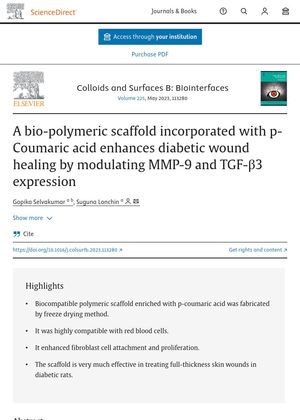A Biopolymeric Scaffold Incorporated With p-Coumaric Acid Enhances Diabetic Wound Healing by Modulating MMP-9 and TGF-β3 Expression
March 2023
in “
Colloids and surfaces. B, Biointerfaces
”

TLDR A new wound dressing with p-Coumaric acid helps heal diabetic wounds faster by reducing inflammation and promoting skin repair.
The study developed a biocompatible polymeric scaffold enriched with p-coumaric acid (Col-OxP3-Ca) to enhance diabetic wound healing. The scaffold demonstrated 85% antioxidant activity, biocompatibility with fibroblast cells, and improved cell proliferation and migration. In diabetic rats, wounds treated with the scaffold healed within 21 days, showing well-developed epidermis, blood vessels, hair follicles, reduced inflammation, and balanced collagen deposition. The scaffold modulated the expression of TGF-β3 and MMP-9, promoting angiogenesis and tissue regeneration. This suggests that Col-OxP3-Ca could be an effective alternative for treating chronic wounds.


